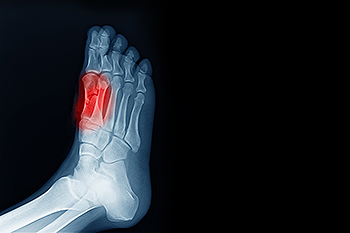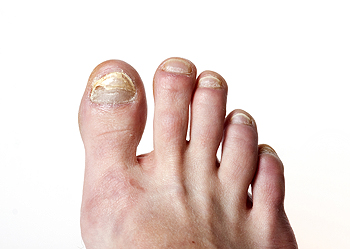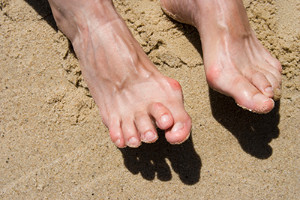Connect With Us
Blog
Items filtered by date: February 2025
How Lupus Can Affect the Feet

Lupus is an autoimmune disease that can affect the feet, often causing pain, swelling, and circulation problems. Inflammation from lupus may lead to joint damage, resulting in conditions such as Jaccoud’s arthropathy, where the toes become misaligned, making walking difficult. Polyarthritis can also develop, causing persistent stiffness and discomfort in the foot and ankle joints. Many people with lupus experience Raynaud’s phenomenon, which reduces blood flow to the toes, leading to cold, numb, or discolored feet. This condition can make standing or walking painful, especially in colder temperatures. Lupus may also cause sores or blisters on the feet to heal slowly, increasing the risk of infection. Nerve damage linked to lupus can result in tingling, burning sensations, or loss of feeling in the feet. A podiatrist can help manage these symptoms by evaluating your foot structure, addressing circulation concerns, and recommending treatments that improve mobility and reduce pain. In severe cases, surgery may be needed to correct deformities. If you have foot pain that may be related to lupus, it is suggested that you schedule an appointment with a podiatrist for an exam and appropriate treatment solutions.
When dealing with systemic disease of the feet, it is extremely important to check the affected areas routinely so that any additional problems are caught quickly. If you have any concerns about your feet and ankles contact Michael Tomey, DPM from Cary Foot & Ankle Specialists. Our doctor will assist you with all of your podiatric needs.
Systemic Diseases of the Feet
Systemic diseases affect the whole body, and symptoms usually are displayed in the feet. This condition can make a patient’s ability to walk unbearable. Systemic diseases include gout, diabetes mellitus, neurological disorders, and arthritis.
Gout – is caused by an excess of uric acid in the body. Common symptoms include pain, inflammation, and redness at the metatarsal/phalangeal joint of the base big toe. Gout can be treated by NSAIDs to relieve pain and inflammation, and other drugs that lower the acid levels in the body.
Diabetes mellitus – is an increase in the level of blood sugar that the body cannot counteract with its own insulin. Failure to produce enough insulin is a factor in Diabetes.
Diabetes of the Feet
Diabetic Neuropathy – may lead to damaged nerves and affect the feet through numbness and loss of sensation.
Peripheral Vascular Disease – can restrict the blood flow to the feet, and often times lead to amputation of the feet.
If you have any questions please feel free to contact our office located in Cary, NC . We offer the newest diagnostic and treatment technologies for all your foot and ankle needs.
What Is Sesamoiditis?

Sesamoiditis is a painful condition that affects two small sesamoid bones located under the big toe joint. It occurs when these bones become irritated or inflamed, usually due to overuse or repetitive pressure from high-impact activities like running or jumping. Symptoms include pain at the base of the big toe, swelling, and tenderness, especially when bearing weight or pushing off during walking or running. The pain from sesamoiditis can feel sharp or throbbing, and it often worsens with activity. Rest and anti-inflammatory medications are common initial treatments. Wearing cushioned footwear or using custom orthotics to reduce pressure on the affected area can also help. In more severe cases, your podiatrist may recommend corticosteroid injections. This type of doctor specializes in diagnosing and treating conditions like sesamoiditis, helping to reduce pain and prevent further damage. If you are experiencing pain near the base of your big toe, it is suggested that you schedule an appointment with a podiatrist for a tailored treatment plan.
Sesamoiditis is an unpleasant foot condition characterized by pain in the balls of the feet. If you think you’re struggling with sesamoiditis, contact Michael Tomey, DPM of Cary Foot & Ankle Specialists. Our doctor will treat your condition thoroughly and effectively.
Sesamoiditis
Sesamoiditis is a condition of the foot that affects the ball of the foot. It is more common in younger people than it is in older people. It can also occur with people who have begun a new exercise program, since their bodies are adjusting to the new physical regimen. Pain may also be caused by the inflammation of tendons surrounding the bones. It is important to seek treatment in its early stages because if you ignore the pain, this condition can lead to more serious problems such as severe irritation and bone fractures.
Causes of Sesamoiditis
- Sudden increase in activity
- Increase in physically strenuous movement without a proper warm up or build up
- Foot structure: those who have smaller, bonier feet or those with a high arch may be more susceptible
Treatment for sesamoiditis is non-invasive and simple. Doctors may recommend a strict rest period where the patient forgoes most physical activity. This will help give the patient time to heal their feet through limited activity. For serious cases, it is best to speak with your doctor to determine a treatment option that will help your specific needs.
If you have any questions please feel free to contact our office located in Cary, NC . We offer the newest diagnostic and treatment technologies for all your foot and ankle needs.
Causes and Treatment of Toenail Fungus

Toenail fungus, also called onychomycosis, is a common infection that makes nails thick, discolored, brittle, and sometimes painful. It happens when fungi get under the nail, often due to warm, moist conditions. Walking barefoot in public places like around pools, gyms, or locker rooms increases the risk. People with diabetes, poor circulation, or a weakened immune system are more prone to it. A podiatrist can diagnose toenail fungus by examining the nail and sometimes taking a sample for testing. Treatments include topical antifungal medications, which work best for mild to moderate cases, and oral medications for more severe infections. If oral treatments are not an option due to health reasons, topical therapy may still be effective. Laser treatment or nail removal may be needed in stubborn cases. If your toenails are thick, brittle, or discolored, it is suggested that you see a podiatrist for appropriate treatment solutions.
If left untreated, toenail fungus may spread to other toenails, skin, or even fingernails. If you suspect you have toenail fungus it is important to seek treatment right away. For more information about treatment, contact Michael Tomey, DPM of Cary Foot & Ankle Specialists. Our doctor can provide the care you need to keep you pain-free and on your feet.
Symptoms
- Warped or oddly shaped nails
- Yellowish nails
- Loose/separated nail
- Buildup of bits and pieces of nail fragments under the nail
- Brittle, broken, thickened nail
Treatment
If self-care strategies and over-the-counter medications does not help your fungus, your podiatrist may give you a prescription drug instead. Even if you find relief from your toenail fungus symptoms, you may experience a repeat infection in the future.
Prevention
In order to prevent getting toenail fungus in the future, you should always make sure to wash your feet with soap and water. After washing, it is important to dry your feet thoroughly especially in between the toes. When trimming your toenails, be sure to trim straight across instead of in a rounded shape. It is crucial not to cover up discolored nails with nail polish because that will prevent your nail from being able to “breathe”.
In some cases, surgical procedure may be needed to remove the toenail fungus. Consult with your podiatrist about the best treatment options for your case of toenail fungus.
If you have any questions, please feel free to contact our office located in Cary, NC . We offer the newest diagnostic and treatment technologies for all your foot care needs.
Gout Pain Can Be Managed
Description of Hammertoe

Hammertoe is a deformity where one or more toes become bent at the middle joint, resembling a hammer. This condition often develops from an imbalance in the muscles and tendons that control the toe’s movement. Common causes include wearing ill-fitting shoes, high heels, arthritis, or a congenital predisposition. Symptoms of hammertoe include pain or tenderness in the affected toe, especially when wearing shoes. Corns or calluses that form on the top of the bent joint and difficulty moving the toe are other signs. The toe may become rigid over time, making it harder to straighten. Treatment for hammertoe typically starts with conservative methods, such as wearing roomy shoes, using orthotic devices, and performing foot exercises to stretch the muscles. In more severe cases, surgery may be necessary to realign the toe. A podiatrist can help diagnose hammertoe, recommend appropriate footwear, and guide you through treatment options. If you are experiencing this condition, it is suggested that you schedule an appointment with a this type of doctor.
Hammertoe
Hammertoes can be a painful condition to live with. For more information, contact Michael Tomey, DPM from Cary Foot & Ankle Specialists. Our doctor will answer any of your foot- and ankle-related questions.
Hammertoe is a foot deformity that affects the joints of the second, third, fourth, or fifth toes of your feet. It is a painful foot condition in which these toes curl and arch up, which can often lead to pain when wearing footwear.
Symptoms
- Pain in the affected toes
- Development of corns or calluses due to friction
- Inflammation
- Redness
- Contracture of the toes
Causes
Genetics – People who are genetically predisposed to hammertoe are often more susceptible
Arthritis – Because arthritis affects the joints in your toes, further deformities stemming from arthritis can occur
Trauma – Direct trauma to the toes could potentially lead to hammertoe
Ill-fitting shoes – Undue pressure on the front of the toes from ill-fitting shoes can potentially lead to the development of hammertoe
Treatment
Orthotics – Custom made inserts can be used to help relieve pressure placed on the toes and therefore relieve some of the pain associated with it
Medications – Oral medications such as anti-inflammatories or NSAIDs could be used to treat the pain and inflammation hammertoes causes. Injections of corticosteroids are also sometimes used
Surgery – In more severe cases where the hammertoes have become more rigid, foot surgery is a potential option
If you have any questions please contact our office located in Cary, NC . We offer the newest diagnostic and treatment technologies for all your foot and ankle needs.

